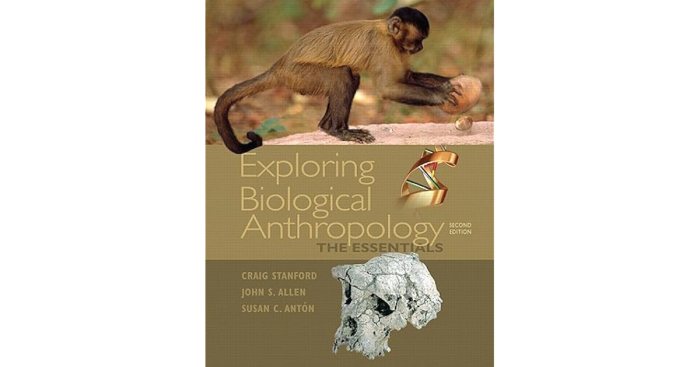Essentials of biological anthropology 5th edition – As Essentials of Biological Anthropology, 5th Edition takes center stage, it invites readers into a captivating realm of scientific inquiry, where the intricacies of human evolution and adaptation are unraveled with meticulous precision. This comprehensive guide delves into the fundamental principles of biological anthropology, providing a panoramic view of the field’s major concepts, theories, and applications.
Through engaging prose and cutting-edge research, the book explores the origins of our species, the remarkable diversity of human populations, the intricate social dynamics of non-human primates, and the pressing health challenges facing humanity today. Essentials of Biological Anthropology, 5th Edition stands as an indispensable resource for students, researchers, and anyone seeking a deeper understanding of the human experience.
Introduction
Biological anthropology is a scientific field that studies the biological and behavioral aspects of humans and their ancestors. It encompasses a broad range of topics, including human evolution, human variation, primate behavior, human biology, and forensic anthropology. The 5th edition of “Essentials of Biological Anthropology” provides a comprehensive overview of these key areas of study, offering an up-to-date synthesis of current knowledge and research.
Evolutionary Theory and Human Origins
Evolutionary theory provides the framework for understanding human evolution. This theory explains how species change over time through the process of natural selection. The fossil record and archaeological evidence support the theory of human evolution, providing insights into the origins and dispersal of modern humans.
The Fossil Record
The fossil record provides evidence of the evolutionary history of humans and their ancestors. Fossils of early hominins, such as Australopithecusand Homo habilis, provide clues about the physical characteristics and behaviors of our ancestors.
Archaeological Evidence, Essentials of biological anthropology 5th edition
Archaeological evidence, such as stone tools and artifacts, helps to reconstruct the cultural and technological development of human societies. By studying these artifacts, anthropologists can gain insights into the social organization, subsistence strategies, and technological innovations of our ancestors.
Human Variation and Adaptation: Essentials Of Biological Anthropology 5th Edition

Human variation refers to the diversity of physical, genetic, and behavioral traits within the human species. This variation is a result of both biological and cultural factors.
Biological Factors
Biological factors, such as genetics and environmental influences, contribute to human variation. Genetic variation, in particular, plays a significant role in determining physical traits, such as skin color, hair texture, and height.
Cultural Factors
Cultural factors, such as diet, lifestyle, and social norms, can also influence human variation. For example, cultural practices, such as foot binding or body modification, can alter physical appearance.
Primate Behavior and Ecology

Primate behavior and ecology provide insights into the evolutionary history and social organization of humans. Non-human primates, such as chimpanzees, bonobos, and gorillas, share many behavioral and ecological similarities with humans.
Social Behavior
Primates live in complex social groups with distinct social structures and communication systems. Studying primate social behavior helps anthropologists understand the evolution of human sociality.
Ecological Adaptations
Primates have adapted to a wide range of ecological niches, from tropical rainforests to deserts. Studying primate ecology helps anthropologists understand the environmental factors that have influenced human evolution.
Query Resolution
What is the significance of biological anthropology?
Biological anthropology plays a pivotal role in understanding human evolution, adaptation, and diversity. It provides insights into our origins, the factors that have shaped our species, and the biological mechanisms that underlie human behavior.
How does Essentials of Biological Anthropology, 5th Edition differ from previous editions?
The 5th edition has been thoroughly updated and revised to reflect the latest advancements in biological anthropology. It includes new chapters on forensic anthropology and the applications of biological anthropology to global challenges, such as climate change and emerging diseases.
Who is the intended audience for Essentials of Biological Anthropology, 5th Edition?
This book is designed for students, researchers, and anyone interested in gaining a comprehensive understanding of biological anthropology. It is an essential resource for those seeking to pursue careers in anthropology, forensic science, public health, and related fields.